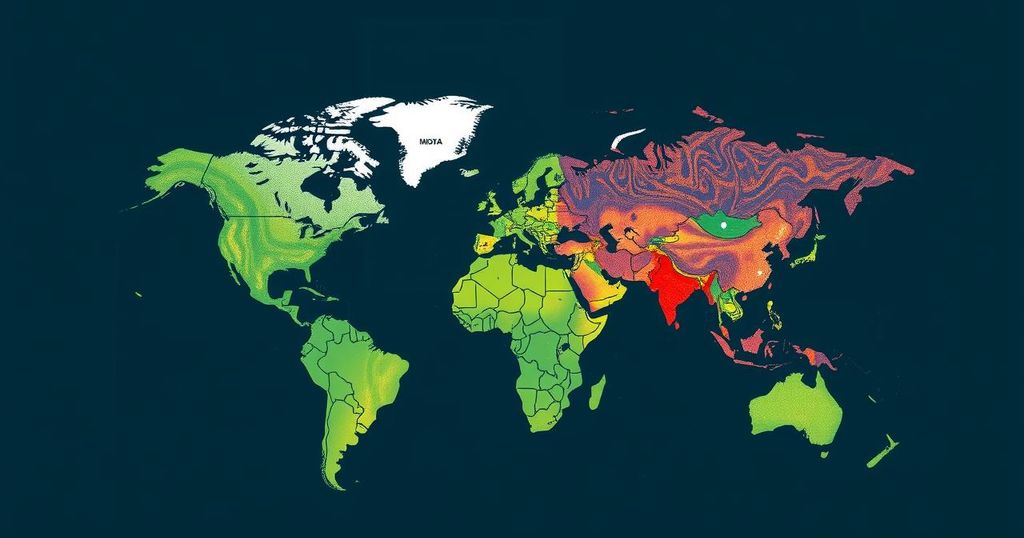Concerns Rise Over Global Climate Efforts Amid Fears of Trump 2.0

The re-election of Donald Trump could hinder global climate efforts, particularly due to potential withdrawals from international agreements like the Paris Accord. Experts express concerns about increased carbon emissions from major polluters like China, while others maintain optimism regarding global resilience and local actions in addressing climate change, anticipating crucial discussions at the upcoming U.N. climate negotiations.
The re-election of Donald Trump poses significant concerns for global climate initiatives, reminiscent of his previous presidency when the United States withdrew from the Paris Agreement. Experts warn that a second term for Trump could exacerbate the U.S. detachment from international climate cooperation, likely resulting in a domino effect on other nations, particularly major carbon emitters like China. This withdrawal may hinder not only the current administration’s climate actions but also future efforts. As the world grapples with accelerating climate impacts—including persistent droughts, hurricanes, floods, and wildfires—there is a palpable fear that Trump’s leadership may embolden other nations to lessen their commitments to climate action. “There’s no hope of reaching a safe climate without substantive action from the United States, from China, from Europe,” stated Rob Jackson, a climate scientist at Stanford University, emphasizing the urgent need for unified action across countries. In contrast, some analysts remain cautiously optimistic, arguing that while U.S. disengagement may create challenges, the international climate framework has proven resilient, as illustrated by previous commitments made during Trump’s first term. With the upcoming U.N. climate negotiations in Baku, Azerbaijan, scheduled to address critical strategies to enhance global emission reductions, the focus is on whether other nations will bolster their commitments in response to a potential U.S. retreat. Historical context reveals that when Trump exited the Paris Agreement in 2017, there was no significant exodus of other nations from this framework. Instead, alternative coalitions within the U.S. emerged to champion climate action despite federal withdrawal. The defeat of U.S. leadership in climate negotiations during a potential Trump administration significantly raises the stakes for continued global efforts, as withdrawal from foundational treaties could alienate the U.S. from crucial conversations about climate action. As Patrick Meyer from E3G articulates, pulling out of the U.N. framework could effectively sideline the U.S. in international dialogues on climate change. However, experts assert that the global community has adapted to fluctuations in U.S. policy over recent decades. Despite apprehensions over Trump’s possible regressive actions on climate policies, individuals within the field express hope that localized initiatives and international cooperation may persist. Christiana Figueres, former U.N. climate chief, remarks, “There is an antidote to doom and despair… it’s action on the ground and it’s happening in all corners of the Earth.” This sentiment suggests an ongoing commitment to addressing climate challenges, regardless of shifts in U.S. leadership.
The context surrounding climate efforts is heavily influenced by international agreements like the Paris Agreement, which aim to mitigate climate change through collective commitments from participating nations. The U.S. has historically played a key role in these international negotiations, shaping policy directions and responsibilities across global stakeholders. However, political shifts within the U.S., particularly during Trump’s administration, raised alarms about the potential rollback of climate progress as his presidency coincided with heightened climate emergencies globally. The looming possibility of Trump re-assuming office raises questions regarding the sustainability of these agreements and whether other major economies will rise to fill the leadership void left by a retreating U.S.
In summary, a second Trump presidency is poised to challenge global climate initiatives by potentially withdrawing the United States from critical agreements and discouraging proactive measures among other nations. Despite concerns over diminished U.S. engagement, experts highlight the resilience of international climate frameworks and the possibility of sustained action driven by other nations. The upcoming U.N. climate summit will serve as a crucial touchstone for evaluating the international community’s capacity to respond to U.S. shifts while maintaining momentum against climate change.
Original Source: www.nationalobserver.com






